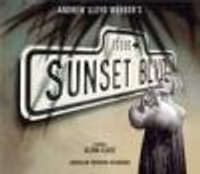Sondheim's weaker lyrics/rhymes
#75Sondheim's weaker lyrics/rhymes
Posted: 12/28/13 at 6:13pm
Reading this thread is like listening to a classroom full of all my worst students ever; the ones who like to make themselves feel smart by pointing out how bad great artists are. And you can't explain to them how they don't get it, because they vastly prefer the illusion of feeling smart more than learning anything.
Except that is NOT for the most part what has occurred in this thread. Most of us are just discussing lines that surprise us precisely because they come from the magical pencil of our favorite lyricist.
Thanks to Morosco, we now know why "careen" is not an acceptable substitute for "career". That doesn't convince me "career" is a verb Carlotta would know and use, but at least it tells us one reason why Sondheim made the choice he did.
I don't for a moment believe that Sondheim writes any lyric haphazardly; on the contrary, I assume he has a reason for each choice even if I don't understand it. And I assume we--who have heard the same songs hundreds of times--were speculating on those reasons here.
***
Personally, I'm shocked to hear that Sondheim cut "you're not good/you're not bad/you're just nice". I thought it was the point of the entire show! (And I think it describes almost all of us, not just a certain "type".)
#76Sondheim's weaker lyrics/rhymes
Posted: 12/28/13 at 8:13pm
"Personally, I'm shocked to hear that Sondheim cut 'you're not good/you're not bad/you're just nice'."
- I agree that that's one of his most memorable and perfect lyrics. For what it's worth, that lyric is in the Feb. 11 2013 version of the movie script floating around. What gives me pause and I pray is a typo (although I didn't notice any others) is in "I Know Things Now" in which LRRH sings "Nice is BETTER than good."
Updated On: 12/30/13 at 08:13 PM
Owen22
Broadway Legend Joined: 2/24/11
#77Sondheim's weaker lyrics/rhymes
Posted: 12/28/13 at 8:43pm
I've always had a problem with Charley's lyric from "Franklin Shepherd Inc":
"No I like money alot/mmmmmm/
I mean, it's better than not!"
What are we to glean from this lyric. I'm guessing what Sondheim means Charley to [sloppily] say is he "likes money a lot. I mean its better than not (having any)". Which is really bad lyric writing, leaving off the rest of a sentence for the sake of a rhyme. Unless he means its better than NOT liking money. Which doesn't make much sense, as I would think someone like Charley would admire someone who isn't materialistic.
To me it's so bad a lyric I have always thought I'm missing something cause how could he (God) writing something so obviously lazy and not good?
Updated On: 12/28/13 at 08:43 PM
TheFoozle
Swing Joined: 10/22/12
#78Sondheim's weaker lyrics/rhymes
Posted: 12/29/13 at 2:34pm
While I do adore almost all of Sondheim's works, there are a few of his lines that can make me wince while listening. One such example comes from the ending of "Into the Wood":
"Into the woods - you have to grope,
But that's the way you learn to cope."
I know what is meant by the line - that all of the searching and moments of uncertainty are what allow us to become who we are and to make it in this word (all very important ideas of the show). But it never works for me in this line. Part of it may be that I'm much more used to hearing the word "grope" be used in a sexual context, but I am always forced to think about that line when I hear it despite knowing the lyrics. This may just be me so I hope I'm not making enemies in mentioning this line.
#79Sondheim's weaker lyrics/rhymes
Posted: 12/29/13 at 3:15pm
I never had a problem with the raisin/liaison lyric only because the character that sings the song is European and she would pronounce the word raisin as "raise-on" which therefore rhymes with liaison.
If you sing it with an American enunciation the rhyme gets lost.
#80Sondheim's weaker lyrics/rhymes
Posted: 12/29/13 at 4:01pm
I never had a problem with the raisin rhyme because wit is my raison d'être .
Like many of the other "weak rhymes" mentioned in this thread by people with little or no imagination--the rhyme displays wit, not merely the lyricist's wit but also the character's wit.
TheFoozle
Swing Joined: 10/22/12
#81Sondheim's weaker lyrics/rhymes
Posted: 12/29/13 at 4:06pm
After looking at a few different clips and recordings, I appreciate what the recent Broadway revival of "Night Music" did with the raisin/liaison line in having Mme. Armfeldt seemingly realize the absurdity of ending a line with "raisins" and then having to adjust her pronunciation of "liaisons" to fit. Having the character in on the joke sells the line for me.
The same thing happens in "Phantom" during "Notes" when one is confronted with a "letter [he] wrote" and asks "What is it that we're meant to have wrote? - written?" While I don't think this example works as well- "rhyming" wrote and wrote with one not fitting grammatically, in Sondheim's "Liaisons," when the actor can sell the line is when it works. I've always found it weak until I heard Elaine Stritch absolutely "Stritch" up the line:
"No! Not even figs - raisins. Oh my god: Liai-zins!"
While it may not be the refined Mme. Armfeldt one is used to, it works very well for the actress in the role.
In the link below, she sings it a little less abrasively than the recording I've heard, but still good for the point being made.
Elaine Stritch
#82Sondheim's weaker lyrics/rhymes
Posted: 12/29/13 at 4:47pm
Well said. I think Sondheim covers himself by acknowledging the rhyme is forced, and having the character catch herself.
Newintown, you don't think anyone can both realize that Sondheim is a genius when it comes to his craft, and still have issue with certain lyrics? Certainly, for me, most of the issues are personal ones, but I would hate to think a student in one of your classes could never have a valid point if he dislikes something in, say, the works of Shakespeare.
sassylash3s
Stand-by Joined: 7/5/11
#83Sondheim's weaker lyrics/rhymes
Posted: 12/29/13 at 6:10pm
I've always been bothered by "What do you leave to your child when you're dead?/Only whatever you put in its head."
I don't know if I'd call it an "objectively weak" lyric but I've always found it clunky, particularly the part where it refers to a child as "it."
Updated On: 12/29/13 at 06:10 PM
#84Sondheim's weaker lyrics/rhymes
Posted: 12/29/13 at 6:20pm
From MERRILY:
Charley, Why can't it be like it was?
I liked it the way that it was,
Charley — You and me, we were nicer then.
We were nice,
Kids and cities and trees were nice,
Everything …
I don't know who we are any more,
And I'm starting not to care.
Wait, what?? Trees were nice?
#85Sondheim's weaker lyrics/rhymes
Posted: 12/29/13 at 6:22pm
Speaking of Shakespeare, I think THE TEMPEST--despite much beautiful poetry--is dramaturgically weak. There is simply no reason left in the script we have (Who knows what was lost along the way?) for Prospero's sudden revelation and reversal.
This does NOT mean I think I am smarter than Shakespeare. Jeeze!
#86Sondheim's weaker lyrics/rhymes
Posted: 12/29/13 at 6:26pm
Owen, you're certainly not wrong about the grammatical short cut in "money a lot/better than not", but it's a grammatical construction that was quite common at the time the show was written. (Bricks were falling out of clear blue skies at the time, too.)
It's akin to Valley speech: I love Justin Bieber--not!
Speaking for myself, I always assume the contrast is between "having money" and "not having money", as you suggest.
#87Sondheim's weaker lyrics/rhymes
Posted: 12/29/13 at 8:15pm
I just wanted to say that I have enjoyed reading this thread, and I cannot believe the immaturity that some well-respected long term posters are displaying within it.
God forbid BWW have an interesting, on-topic discussion without posters being likened to terrible students or being accused of having no imagination.
#88Sondheim's weaker lyrics/rhymes
Posted: 12/29/13 at 8:21pm
"I just wanted to say that I have enjoyed reading this thread, and I cannot believe the immaturity that some well-respected long term posters are displaying within it.
God forbid BWW have an interesting, on-topic discussion without posters being likened to terrible students or being accused of having no imagination."
This. This so much. I was a little offended by that.
Updated On: 12/29/13 at 08:21 PM
#89Sondheim's weaker lyrics/rhymes
Posted: 12/29/13 at 8:33pm
Thanks, guys (not that I'm assuming you are talking about my posts).
I consider this sort of critical analysis the highest form of respect. I don't see anyone paying such close attention to any other lyricist.
After Eight
Broadway Legend Joined: 6/5/09
#90Sondheim's weaker lyrics/rhymes
Posted: 12/29/13 at 8:53pm
"I don't see anyone paying such close attention to any other lyricist."
That's the problem right there, considering the superiority of so many others.
#91Sondheim's weaker lyrics/rhymes
Posted: 12/30/13 at 3:24am
" 'I don't see anyone paying such close attention to any other lyricist.'
That's the problem right there, considering the superiority of so many others."
I don't understand why this poses a "problem." If there is another lyricist whose lyrics you'd care to discuss, why not start another thread doing so?
After Eight
Broadway Legend Joined: 6/5/09
#92Sondheim's weaker lyrics/rhymes
Posted: 12/30/13 at 8:03am
^
The problem is not the thread, it's the attitude.
#93Sondheim's weaker lyrics/rhymes
Posted: 12/30/13 at 8:27am
Ericmontreal, the point is not that no one is allowed to "have issues" with any lyrics. You're "allowed" to do just about anything.
The point is that all the lyrics complained about here are just fine; the complainers just aren't able or willing to understand why they're fine. Joey has tried to point it out, but no one seems to be listening, preferring to think they're so brilliant, they've found the flaws in the work of a great artist.
I thought I'd been clear about that point earlier.
#94Sondheim's weaker lyrics/rhymes
Posted: 12/30/13 at 8:31amWell then, perhaps we should discuss some other lyricists. Cole must've been pretty stuck when he came up with "a nominee of the G.O.P." "or GOP", don't ya think?
#95Sondheim's weaker lyrics/rhymes
Posted: 12/30/13 at 8:38am
Guys, I found this picture of After Eight on the Internet:

#96Sondheim's weaker lyrics/rhymes
Posted: 12/30/13 at 8:43am
Sondheim fans are about as understanding and tolerant as those of Duck Dynasty
this was always a groaner lyric for me:
Hey! Hoy! Sailor boy!
Want it snugly harbored?
Open me gate, but dock it straight,
I see it lists to starboard.
Updated On: 12/30/13 at 08:43 AM
#97Sondheim's weaker lyrics/rhymes
Posted: 12/30/13 at 9:21am...he generalized.
#98Sondheim's weaker lyrics/rhymes
Posted: 12/30/13 at 9:25am
I don't see how "understanding" or "tolerance" factor into the equation at hand. When a teacher explains to you that you're not understanding the lesson, is that teacher lacking in understanding or tolerance?
Art appreciation may be a subjective thing, but the technique of any art form isn't. Sondheim's mastery of technique is as acknowledged as DaVinci's, Shakespeare's, or Britten's. He knows how to write great lyrics for character and situation. One might not "like" what he wrote, just as one might not "like" Elizabeth Browning's 43rd sonnet, but the technique is only questioned by those who haven't learned it.
As for the Beggar Woman's lyric quoted above - it's meant to be either a folk song or the bastardization of a folk song sung by a woman whose mind has shattered, placed at a rather heightened and technically important place in the show (the character's introduction). I think the effectiveness of that lyric is above cavil.
#99Sondheim's weaker lyrics/rhymes
Posted: 12/30/13 at 9:32am
Here's something that might not have occurred to the long-time posters in question:
Some people just don't like a lyric or rhyme. In their subjective opinion, they might characterize it as "weaker." No one's saying he's not everything you say he is. In most cases, they're not even saying they don't get why he went with that lyric. They're just saying that they don't care for that particular example, that they think something better could have been there. They're not saying it's not great craft. They're just saying they didn't feel that particular example is the best representation of said craft.
newintown, PJ, surely there's at least one Sondheim lyric you don't really care for? Some rhyme that you prefer a little less than the rest? That's all this is -- an exercise in pointing them out, with a thread title designed to foment discussion. No one's claiming to be better at Steve's job, no one's handing him back this lyric with "capable of doing better" written across it, they're just expressing an opinion. And after your bagging on the other posters in this thread, frankly I'd love to hear yours rather than hear any more bashing of people. Opinions about art are by and large subjective, but I can't possibly imagine you like absolutely every lyric he's ever written.
Broadway Legend
joined: 5/1/05
Blocked: After Eight, suestorm, david_fick, emlodik, lovebwy, Dave28282, joevitus, BorisTomashevsky, Seb28
Videos














